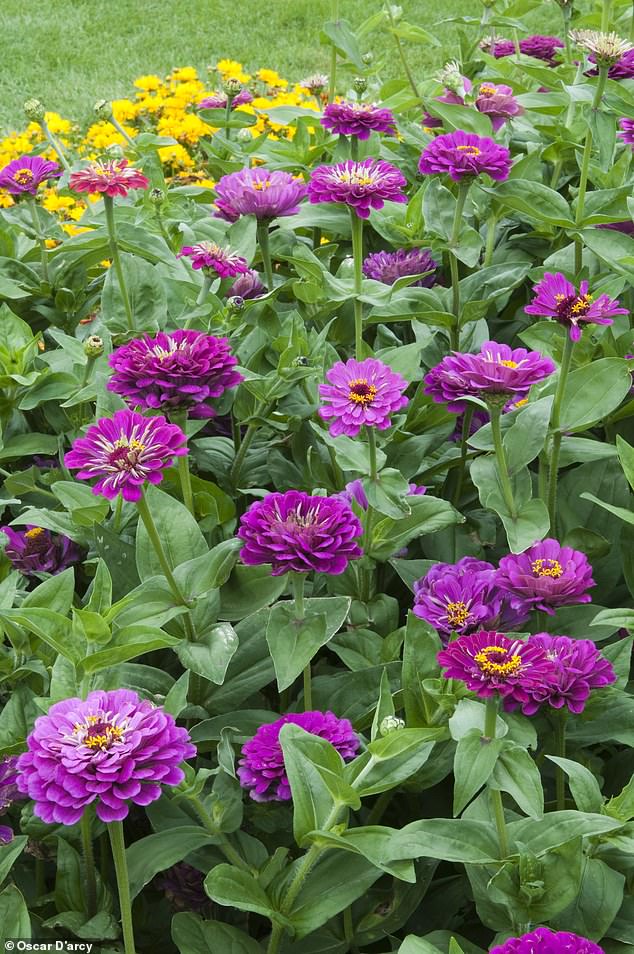Action plan: Nigel Colborn’s essential jobs for your garden this week
- Nigel Colborn shares advice for growing vegetables and flowers ahead of spring
- British gardening expert says tender crops don’t need starting before February
- Tender ornamentals can be sown this month if you have a heated propagator
SPRING IS AROUND THE CORNER
Yes, it’s wet and cold out there but all things will pass. And I’m pleased that new seed catalogues are piling up on my desk, all with tempting offers of delicious vegetables and gorgeous flowers.
Popular varieties will sell fast, so make your choices and place your orders as soon as you can. But don’t sow your seeds too early. Tender crops such as tomatoes or greenhouse cucumbers don’t need starting before late February.
By March, days will be lengthening rapidly and greenhouse heating costs will be lower.
If you have a heated propagator, seeds of tender ornamentals such as pelargoniums can be sown this month. But the baby plants must be frost-free. So you’ll need greenhouse space for those.
Nigel Colborn shared his advice for growing vegetables and flowers as spring approaches. Pictured: Zinnias
When ordering seeds, it’s wise to develop a planting plan for both food crops and flowers. That will help you to avoid over-buying. But if you end up with a surplus, or have seeds left over from last year, those can be used again.
Most veg seeds are viable for several years, though germination rates slowly decline. Annual flower seeds, such as zinnias (pictured), are fertile for several years, too, but also come up in smaller numbers.
Where space is short, sow veg seeds, especially peas, beans, brassicas and leafy vegetables such as spinach and chard, in cell trays. That results in healthy youngsters for planting out individually.
CUT BACK AUTUMN RASPBERRIES
If you grow autumn raspberries which crop from August, cut all their canes to ground level now. This year’s crop will be carried on shoots which will emerge this spring. If you grow summer raspberries too, leave those untouched. Their fruit will ripen much earlier on canes which grew last summer.
SPUDS BENEFIT FROM CHITTING
For early new potatoes, set the seed tubers out for ‘chitting’ now. Arrange the seed potatoes on a tray or in a fibre egg tray with their top ends uppermost. If you check each tuber, you’ll see that most of the embryonic buds or ‘eyes’ are at one end. That is the top of the tuber.
Place each tray somewhere frost free and in full light.
QUESTION
A Japanese quince, Pink Lady, on our east-facing wall grew out of control. Our son pruned it hard and tied it back. It now flowers heavily on outward-growing branches. Could those be cut off?
Mr A. Jones
Japanese quinces, Chaenomeles, make superb wall plants but need training. Your son did the right thing by cutting excess growth away and training the rest.
Allow the new shoots to grow, then in August, prune them back to 15cm. The stumps will carry blossom from January next year.
Over time, you’ll need to thin the whole shrub. Do that in winter.
Shorten the new shoots each August.
PLANT OF THE WEEK: BROMPTON STOCKS
Close relatives of wallflowers, these lovely plants can grow as annuals or biennials. Sturdy single stems are furnished with narrow, greygreen leaves and intensely fragrant flowers. Stocks are superb as cut flowers. They’re easy to grow from seed sown in spring or summer. The seedlings can be planted outside from late April or grown in a greenhouse. Flower colours range from dark purple, through mauve, pink, soft beige or white. Seed is available from suppliers such as marshallsgarden.com or mr-fothergills.co.uk.
